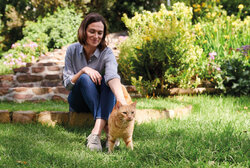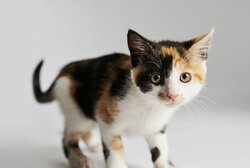A kitten is moving in
Before a kitten moves in, you should prepare your home for the new family member. We will show you what is important here, what to bear in mind when picking up your kitten, and how to make the acclimatisation process as stress-free as possible.
Preparing the kitten’s new home
Kittens are extremely curious and playful. They do not worry about things that could be dangerous for them. You should therefore check your home thoroughly before your kitten moves in. Remove all possible sources of danger such as any pins and paper clips that are lying around, pointed and sharp objects, balls of wool and ribbons, open plastic bags, anything containing chemicals, and candles. Take any snacks such as crisps or chocolate away from the table. Remove any tablecloths for the next few weeks; kittens love to climb and it is highly likely that they will grab hold of them and pull everything off the table. Find out if any of your plants are poisonous for cats and if so, keep them out of the kitten’s reach. Also, remove any plants that are on the floor, because kittens love to dig in the soil.
Basic items for kittens
To make it easier for kittens to settle in, all the essential items and amenities should already be in place when they move into your home. It is best to make a checklist so that you do not forget anything. However, before you go shopping, ask the breeder or the animal shelter what food and what cat litter they use, so you know what your kitten is used to. If possible, you should buy exactly the same products. Cats can be very sensitive regarding the smell and colour of their food and cat litter. You should therefore not make any changes here for the time being. This could lead to unnecessary complications in the form of diarrhoea or uncleanliness. Also take care when choosing a litter tray. Your kitten may have only been used to a very shallow tray. A high edge, a cover or even an “entrance door” could cause them to avoid the litter tray and to use another place in your home.
In addition to food, a litter tray and the litter itself, your checklist should also include a soft, comfy place to sleep, a transport box, snacks and plenty of toys. You really can never have enough things for you kitten to play with, although you should not give them to your pet all at once. You should also make sure that your kitten has something to scratch on, the simplest solution being a cat tree. This is often the centrepiece of a cat household. Here the kitten has a good view, and it can relax in peace, sharpen its claws, and enjoy climbing up and down and playing on the tree. However, remember that while the kitten is still young, the cat tree should not be too high in order to avoid any severe falls.

What should I bear in mind when picking up my kitten?
A transport box is ideal for picking up your new pet. A few days before the move, give the breeder or shelter a soft cuddly blanket or towel, and ask them to bring it into contact with the kitten’s mother and/or siblings. Put this blanket into the transport box when you pick up your kitten. The familiar smell will have a calming effect on your pet during the journey and in its new home. It is ideal if you have someone to pick up the kitten with you, then one of you can look after it during the drive home. Do not drive too fast to avoid frightening your pet unnecessarily. And remember to take a kitchen roll with you. Your kitten may well be so anxious that it throws up.
The first hours in the new home
It is perfectly normal for the kitten to be a little upset at first after the car journey. It has just lost its mother and siblings, it has been on a stressful journey, and it is surrounded by strangers. What it needs now is plenty of rest. It should therefore not be lifted up in the transport box to allow family members and neighbours to take a look inside. Go straight into your home and find a quiet place for the new addition to your family. If there are small, playful children, or a dog or another cat in the household, it is best to keep the new arrival in a separate room. Alternatively, you can, for example, place the transport box in a quiet corner of the living room. Open the door and move away for the time being. Do not try to pull or lure the kitten out of its box. Give your pet time to calm down and observe the new surroundings from its safe haven.
It can take a few minutes or even an hour or more before the kitten comes out of its box. This depends, among other things, on the kitten’s individual character and the previous experiences it has had with humans. After a while, however, curiosity will prevail and it will emerge from the box. Speak softly to the kitten, do not make any sudden movements, and wait to see if it wants to sniff out the surroundings first or if it would like to make contact with you straight away. You might even be able to lure it out, in which case you could go to the kitchen together, provided you have already placed its bowls there. The water bowl should already be filled, and you can now give your kitten some food. If it hides under the sofa or cupboard and refuses to come out for hours, place food and water in front of its hiding place so that this can be easily reached. Make sure that you choose a high-quality kitten food. This will be a perfect foundation for a species-appropriate diet.
![[Translate to EN:] Kitten spielt mit Ball](/fileadmin/media/images/Magazin/katze/04-Kitten/kitten-zieht-ein/kitten-spielt-mit-ball-magazin-kitten-zieht-ein-contentimage-560x375.jpg)
The acclimatisation phase
How long the adjustment phase lasts depends on a number of factors. If you have decided to have two kittens, it may be shorter, because a sibling or a close friend will give your kitten a feeling of security. Together, the kittens will be more likely to sum up the courage to explore their new surroundings, to climb up the cat tree and to use the litter tray. One will always learn from the other, and they will enjoy playing together and chasing each other. If your kitten is on its own, then you should plan a little more time. You will now be its main companion and playmate. In order to lure the kitten out of its hiding place, bundles of feathers have proven successful, and the kitten will soon be chasing them playfully. Soon you will notice that your kitten is becoming more and more accustomed to its new surroundings. It will arrive to eat its food on time, obediently use the litter tray, allow itself to be stroked, and generally become more and more adventurous and self-confident.
Tipp: If you have decided to keep your kitten in a separate room because of other pets, you should leave the door firmly shut to start with. When you want to try getting closer to your kitten, it is best if you have a second person there so that each of you can attend to one of the animals. It is advisable to keep a dog on a lead for safety’s sake.
Should the kitten be allowed outside?
A kitten from a farmyard may have a great desire for freedom and could be very keen to go outside, while others may show little interest simply because they have never been outdoors before. Depending on whether you are able to (and intend to) allow your new pet to go outside, you should consider where to buy or adopt your new kitten right from the start. A farm kitten may be the wrong choice if you live higher than the ground floor or in a busy area. If it has grown up in a barn with minimal human contact, keeping it indoors all the time could prove to be a problem. On the other hand, this will not be the case with kittens who have had contact with people from day one. They will never have experienced being outdoors and will be happy if they have a cat-proof balcony. In addition, your kitten should have plenty of things to do in its new home. This is simple if you provide your pet with a variety of cat toys and an interesting cat tree, as well as spending enough time together with your kitten.
Tip: If letting your kitten outside is an option, you should wait a few weeks until it is familiar with its new home and the people around it. Also, talk to your vet to see if they recommend any additional vaccinations or other precautions, such as protection against parasites. Kittens that are allowed outdoors should also be neutered in order to avoid unwanted offspring. If your kitten likes to catch mice, you should take this into account with regard to the amount of food it is given daily. Check with the neighbours in advance to find out whether there are any bowls of food outside from which your pet could eat large amounts without you knowing.
You may also like this

Good cat food
How to recognize a good cat food

Feeding kittens
Tips on food and a healthy diet

Getting your cat used to being outdoors
This is how you get your cat used to being outdoors

Feeding your cat
Tips on food and a healthy diet
